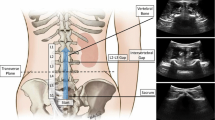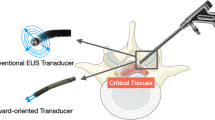Abstract
Purpose
Injection therapy is a commonly used solution for back pain management. This procedure typically involves percutaneous insertion of a needle between or around the vertebrae, to deliver anesthetics near nerve bundles. Most frequently, spinal injections are performed either blindly using palpation or under the guidance of fluoroscopy or computed tomography. Recently, due to the drawbacks of the ionizing radiation of such imaging modalities, there has been a growing interest in using ultrasound imaging as an alternative. However, the complex spinal anatomy with different wave-like structures, affected by speckle noise, makes the accurate identification of the appropriate injection plane difficult. The aim of this study was to propose an automated system that can identify the optimal plane for epidural steroid injections and facet joint injections.
Methods
A multi-scale and multi-directional feature extraction system to provide automated identification of the appropriate plane is proposed. Local Hadamard coefficients are obtained using the sequency-ordered Hadamard transform at multiple scales. Directional features are extracted from local coefficients which correspond to different regions in the ultrasound images. An artificial neural network is trained based on the local directional Hadamard features for classification.
Results
The proposed method yields distinctive features for classification which successfully classified 1032 images out of 1090 for epidural steroid injection and 990 images out of 1052 for facet joint injection. In order to validate the proposed method, a leave-one-out cross-validation was performed. The average classification accuracy for leave-one-out validation was 94 % for epidural and 90 % for facet joint targets. Also, the feature extraction time for the proposed method was 20 ms for a native 2D ultrasound image.
Conclusion
A real-time machine learning system based on the local directional Hadamard features extracted by the sequency-ordered Hadamard transform for detecting the laminae and facet joints in ultrasound images has been proposed. The system has the potential to assist the anesthesiologists in quickly finding the target plane for epidural steroid injections and facet joint injections.










Similar content being viewed by others
References
Beauchamp KG (1984) Applications of Walsh and related functions. Academic press, London
Belavy D, Ruitenberg M, Brijball R (2011) Feasibility study of real-time three-/four-dimensional ultrasound for epidural catheter insertion. Br J Anaesth 107(3):438–445
Chen EC, Mousavi P, Gill S, Fichtinger G, Abolmaesumi P (2010) Ultrasound guided spine needle insertion. In: SPIE Medical Imaging. Visualization, Image Guided Procedures and Modeling, California, USA, pp 762,538–762,538
Donoho DL, Huo X (2002) Beamlets and multiscale image analysis. Springer, New York
Evansa I, Logina I, Vanags I, Borgeat A (2014) Ultrasound versus fluoroscopic-guided epidural steroid injections in patients with degenerative spinal diseases: a prospective, randomised study. Eur J Anaesthesiol 31:1–7
Grau T, Leipold RW, Horter J, Conradi R, Martin EO, Motsch J (2001) Paramedian access to the epidural space: the optimum window for ultrasound imaging. J Clin Anesth 13(3):213–217
Greher M, Scharbert G, Kamolz LP, Beck H, Gustorff B, Kirchmair L, Kapral S (2004) Ultrasound-guided lumbar facet nerve block. Anesthesiology 100(5):1242–8
Hacihaliloglu I, Abugharbieh R, Hodgson AJ, Rohling RN (2009) Bone surface localization in ultrasound using image phase-based features. Ultrasound Med Biol 35(9):1475–1487
Hacihaliloglu I, Rasoulian A, Rohling RN, Abolmaesumi P (2014) Local phase tensor features for 3-d ultrasound to statistical shape + pose spine model registration. IEEE Trans Med Imaging 33(11):2167–2179
Hoy D, March L, Brooks P, Blyth F, Woolf A, Bain C, Williams G, Smith E, Vos T, Barendregt J, Murray C, Burstein R, Buchbinder R (2014) The global burden of low back pain: estimates from the global burden of disease 2010 study. Ann Rheum Dis 73(6):968–974
Karmakar M, Li X, Ho AH, Kwok W, Chui P (2009) Real-time ultrasound-guided paramedian epidural access: evaluation of a novel in-plane technique. Br J Anaesth 102(6):845–854
Le Coq G, Ducot B, Benhamou D (1998) Risk factors of inadequate pain relief during epidural analgesia for labour and delivery. Can J Anaesth 45(8):719–723
Lee A (2014) Ultrasound in obstetric anesthesia. In: Seminars in Perinatology, vol 38. Elsevier, Amsterdam, pp 349–358
Lin TL, Chung CT, Lan HHC, Sheen HM (2014) Ultrasound-guided facet joint injection to treat a spinal cyst. J Chin Med Assoc 77(4):213–216
Moore J, Clarke C, Bainbridge D, Wedlake C, Wiles A, Pace D, Peters T (2009) Image guidance for spinal facet injections using tracked ultrasound. In: Proceedings of Medical Image Computing and Computer-Assisted Intervention-MICCAI, pp 516–523. Springer, Berlin
Murray CJ, Vos T, Lozano R, Naghavi M, Flaxman AD, Michaud C, Ezzati M, Shibuya K, Salomon JA, Abdalla S (2013) Disability-adjusted life years (dalys) for 291 diseases and injuries in 21 regions, 1990–2010: a systematic analysis for the global burden of disease study 2010. Lancet 380(9859):2197–2223
Nickalls R, Kokri M (1986) The width of the posterior epidural space in obstetric patients. Anaesthesia 41(4):432–433
Obernauer J, Galiano K, Gruber H, Bale R, Obwegeser AA, Schatzer R, Loizides A (2013) Ultrasound-guided versus computed tomography-controlled facet joint injections in the middle and lower cervical spine: a prospective randomized clinical trial. Med Ultrason J 15(1):5–10
Rahmatullah B, Papageorghiou AT, Noble JA (2012) Integration of local and global features for anatomical object detection in ultrasound. In: Proceedings of Medical Image Computing and Computer-Assisted Intervention-MICCAI, pp 402–409. Springer, Berlin
Rajpoot K, Noble A, Grau V, Rajpoot NM (2008) Feature detection from echocardiography images using local phase information. In: Proceedings of Medical Image Understanding and Analysis
Rasoulian A, Rohling RN, Abolmaesumi P (2013) Augmentation of paramedian 3d ultrasound images of the spine. In: Proceedings of Information Processing in Computer-Assisted Interventions, pp 51–60. Springer, Berlin
Rubin DI (2007) Epidemiology and risk factors for spine pain. Neurol Clin 25(2):353–371
Santiago AEQ, Leal PC, Bezerra EHM, Giraldes ALA, Ferraro LC, Rezende AH, Sakata RK (2014) Ultrasound-guided facet block to low back pain: a case report. Braz J Anesthesiol (English Edition) 64:278–280
Tran D, Kamani AA, Al-Attas E, Lessoway VA, Massey S, Rohling RN (2010) Single-operator real-time ultrasound-guidance to aim and insert a lumbar epidural needle. Can J Anesth 57(4):313–321
Tran D, Rohling RN (2010) Automatic detection of lumbar anatomy in ultrasound images of human subjects. IEEE Trans Biomed Eng 57(9):2248–2256
Ungi T, Abolmaesumi P, Jalal R, Welch M, Ayukawa I, Nagpal S, Lasso A, Jaeger M, Borschneck DP, Fichtinger G, Mousavi P (2012) Spinal needle navigation by tracked ultrasound snapshots. IEEE Trans Biomed Eng 59(10):2766–2772
Waterman BR, Belmont PJ Jr, Schoenfeld AJ (2012) Low back pain in the united states: incidence and risk factors for presentation in the emergency setting. Spine J 12(1):63–70
Yoon SH, OBrien SL, Tran M (2013) Ultrasound guided spine injections: advancement over fluoroscopic guidance? Curr Phys Med Rehabil Rep 1(2):104–113
Yu S, Tan KK, Sng BL, Li S, Sia ATH (2014) Automatic identification of needle insertion site in epidural anesthesia with a cascading classifier. Ultrasound Med Biol 40(9):1980–1990
Acknowledgments
The authors would like to thank I. Hacihaliloglu and D. Tran for generously providing the implementations of their proposed methods. This study is jointly funded by grants from the Natural Sciences and Engineering Research Council of Canada (NSERC) and Canadian Institutes of Health Research (CIHR). Conflict of interest The authors declare that they have no conflict of interest. Ethical standard All procedures performed in studies involving human participants were in accordance with the ethical standards of the institutional and/or national research committee and with the 1964 Helsinki Declaration and its later amendments or comparable ethical standards. This article does not contain any studies with animals performed by any of the authors. Informed consent Informed consent was obtained from all individual participants included in the study.
Author information
Authors and Affiliations
Corresponding author
Rights and permissions
About this article
Cite this article
Pesteie, M., Abolmaesumi, P., Ashab, H.AD. et al. Real-time ultrasound image classification for spine anesthesia using local directional Hadamard features. Int J CARS 10, 901–912 (2015). https://doi.org/10.1007/s11548-015-1202-5
Received:
Accepted:
Published:
Issue Date:
DOI: https://doi.org/10.1007/s11548-015-1202-5




